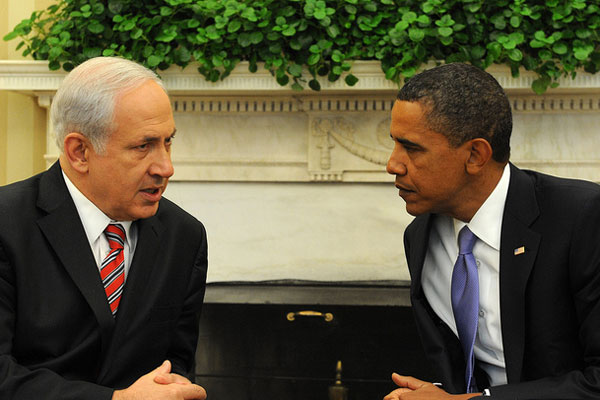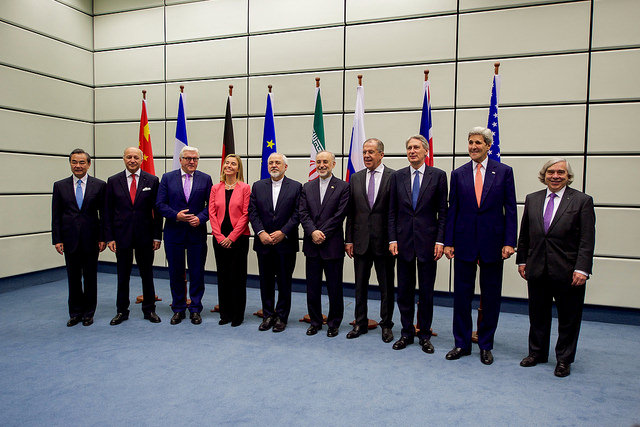Netanyahu put Iran at the top of his political agenda. He was able to push the international community into action but found himself sidelined when it counted. He got the opposition to back him in trashing the deal, but never got the security establishment on board with a military option.

The nuclear deal signed with Iran is “a stunning historic mistake,” Israeli Prime Minister Benjamin Netanyahu told the world on Tuesday. Netanyahu loves to remind us all that he was among the first to highlight the threat Iran poses to Israel — and all of mankind. In his first speech before Congress, in 1996, Netanyahu called Iran “the most dangerous regime [in the region],” and warned about it obtaining nuclear weapons.
When he returned to the Prime Minister’s Office in 2009, Netanyahu made Iran the centerpiece of his policy. At times, he was almost alone in his quest – or obsession, as some have described it. Quite often, there was no way of delineating where the perceived security risks ended and political considerations began. That was true both at home and in Netanyahu’s unprecedented intervention in domestic American politics, all the way to his controversial speech in Congress on the eve of the Israeli elections, in breach of diplomatic protocol. Was it the old Bibi trying to use any possible platform to improve his standing in a tight race, or was it Netanyahu the statesman throwing everything he had into the single-most important issue of his life?
It’s difficult to tell. Netanyahu certainly took the issue of Iran far, but his actions were unconvincing at times. If Iran was a real existential threat to Israel, why fight with President Obama over the settlements? Why alienate the Democratic Party’s “elites?” Certainly, a little goodwill on the Palestinian issue would have gone a long way in getting his message across to the U.S. president. But with Netanyahu, these sort of confrontations are a feature, not a bug. And unlike previous Israeli prime ministers, he has proved extremely capable at transforming those types of diplomatic confrontations into political gains back home.
At first, Netanyahu’s aggressive approach on Iran didn’t go over so well with Israelis. Most of the public remained skeptical and opposed to the military option. Senior politicians came out against him, including former president Shimon Peres and former prime minister Ehud Olmert. Olmert even went so far as to publicly reveal the price tag of Israel’s preparations for a military strike — NIS 11 billion ($3 billion) — which he described as “adventurous delusions” that will never be carried out.
But what really hurt Netanyahu was the unified front he came up against in Israel’s powerful security establishment, which remains skeptical of the military option to this day. Former Mossad chief Meir Dagan led the charge, first in private and then in public, and he was joined by popular then-Shin Bet chief Yuval Diskin and then-IDF chief of staff Gaby Ashkenazi. In a meeting in 2010, the three defiantly stood up against an order by Netanyahu to put security forces and the army on a war footing that would indicate to the world an imminent attack; Bibi and Barak were forced to cancel the order. Though this wasn’t a refusal of a formal order, Dagan later said, “I don’t remember such an incident in our history.” Reports in the Israeli media suggest that the army and Mossad remain in opposition to the military option to this day.
The politics of war in Israel
Netanyahu has been far more successful in moving the political system in his direction. In an interview with The Washington Post last February, on the eve of the general elections, Netanyahu’s chief rival, Labor leader Isaac Herzog, refused to call Iran an “existential threat.” (“It’s a big threat,” Herzog said. “That’s enough.”) He even said that he trusts President Obama “to get a good deal.”
Today, Herzog is singing a different tune. In a post on his Facebook wall on Tuesday, Herzog declared that “Israel’s interests were forgotten” in the deal signed in Vienna. “We are on the verge of a new day in the Middle East, one which will present Israel with complex security risks, more dangerous than we’ve ever known,” mirroring the very language used by Netanyahu.
Yair Lapid of the centrist Yesh Atid party, also in the opposition, took a similar line. “We thought we would get a bad deal — but this is even worse,” he wrote.
Both politicians suggested that Netanyahu is partly responsible for the bad deal, however, suggesting that his rift with the Obama administration sidelined him at the most crucial moment of the negotiations. So far, it doesn’t seem that the public shares their view; when it comes to the discourse of security and existential threats, Netanyahu is still stronger than his opponents and the public still credits him for forcing the international community to take action on Iran.

Just like with the Palestinian issue, the lack of effective political opposition will ensure that the Israeli consensus adopts Netanyahu’s view of the agreement. I would be surprised if the next set of polls show a majority of Israelis supporting the deal. And yet I don’t think there is much support for a military option either. Not now, and certainly not without the security establishment on board.
Netanyahu will now take his war, yet again, to Washington, hoping to get as many members of Congress to oppose the deal. Contrary to popular belief, this is one battle he doesn’t really want to win: if Congress strikes down the deal and the Senate overrides a presidential veto, the sanctions regime will collapse and nothing will stand in Iran’s path to the bomb. Netanyahu will need to choose between going to war and a fully nuclear Iran.
In all likelihood, however, Congress won’t be able to stop the deal. In such a case, and especially if Obama is forced to use his veto, Netanyahu will anoint himself informal guardian of the nuclear deal. Israel will try to gather as much evidence of Iranian violations as possible — once again threatening a military strike if the world doesn’t do something. If you think that today’s agreement will finally put the Iranian issue to rest, guess again.


